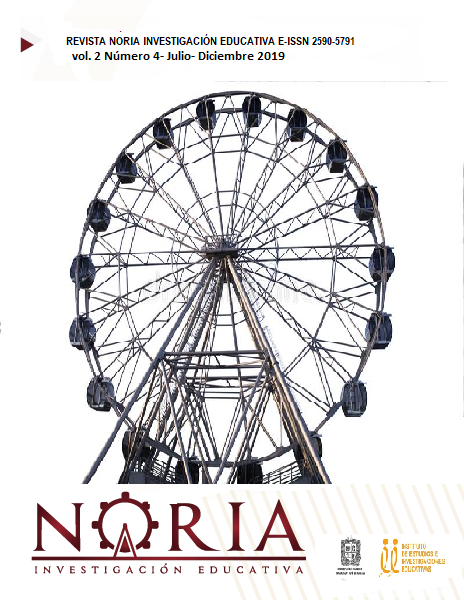DOI:
https://doi.org/10.14483/25905791.16331Publicado:
2019-07-31Número:
Vol. 2 Núm. 4 (2019): Revista Noria Investigación EducativaSección:
Investigación e InnovaciónLa educación en energías renovables no convencionales en la formación de ingenieros electrónicos
Non-conventional renewable energy education in the training of electronic engineers
Palabras clave:
Educación en energías renovables, cambio climático, investigación en educación en ingeniería, formación de ingenieros (es).Descargas
Resumen (es)
En este documento se presentan algunos fundamentos conceptuales, metodológicos y resultados parciales de la investigación del proyecto de tesis doctoral en Educación en Energías Renovables No Convencionales para la Formación de Ingenieros Electrónicos de la Universidad Distrital Francisco José de Caldas, en el énfasis de educación en ciencias del Doctorado Interinstitucional en Educación – DIE UD.
Referencias
Ahmad, S. and Tahar, R.M. (2014). Selection of Renewable Energy Sources for Sustainable Development of Electricity Generation System Using Analytic Hierarchy Process: A Case of Malaysia. Renewable Energy.
Albornoz, M., López, C., (2010). Ciencia, tecnología y universidad en Iberoamérica. 1a ed. - Buenos Aires: Eudeba.
Alfred Watkins, M. E. (2008). Science, Technology, and Innovation. (T. W. Bank, Ed.). Washington DC.
Ballesteros-Ballesteros, V. A., & Gallego-Torres, A. P. (2019b). Modelo de educación en energías renovables desde el compromiso público y la actitud energética. Revista Facultad de Ingeniería, 28(52), 27-42. https://doi.org/10.19053/01211129.v28.n52.2019.9652
Ballesteros-Ballesteros, V., & Gallego-Torres, A. P. (2019). La educación en energías renovables desde las controversias socio-científicas en la educación en ciencias. Revista científica, 2(35), 192-200. https://doi.org/10.14483/23448350.1486
Broman, L., (1994). On the didactics of renewable energy Education - drawing on twenty years experience. Renewable Energy, 5 (1I).
Bruhn, K., Lorensson, S., & Svensson, J. (2009). Development of Learning Material to wind power courses.
Cao, X., Kleit, A., & Liu, C. (2016). Why invest in wind energy? Career incentives and chinese renewable energy politics. Energy Policy.
Fan, X. C., Wang, W. Q., Shi, R. J., & Li, F. T. (2015). Analysis and countermeasures of wind power curtailment in China. Renewable and Sustainable Energy Reviews.
García, E., González, J. C., López-Cerezo, J. A., Luján, J. L., Martín, M., Osorio, C., & Valdés, C. (2001). Ciencia, Tecnología y Sociedad: una aproximación conceptual. Cuadernos de Iberoamérica.
Gyamfia, S., Amankwah, F. (2018). The energy efficiency situation in Ghana. Renewable and Sustainable Energy Reviews, 82.
H P Garg, T. C. K. (1994). Energy engineering education at posgraduate level: issues involved, course structura and its proposed adaptation, 5, 1406–1412.
H P Garg, T. C. K. (1996). REE: Challenges and problems in developing countries, (2), 913–916.
Hasnain, S. M., Elani, U. A., Al-Awaji, S. H., Aba-Oud, H. A., & Smiai, M. S. (1995). Prospects and proposals for solar energy education programmes. Applied Energy.
Hasnain, S., Alawaji, U. A. E. (1998). Solar Energy Education a Viable Pathway for Sustainable development.
Higuera-Cobos, O., Dumitru, F.-D., & Mesa-Grajales, D. (2016). Improvement of abrasive wear resistance of the high chromium cast iron ASTM A-532 through thermal treatment cycles. Revista Facultad de Ingeniería, 25(41), 93-103. https://doi.org/10.19053/01211129.4141
Hungerford, H. R., & Volk, T. L. (1990). Changing learner behavior through environmental education. The journal of environmental education.
Intergovernmental Panel on Climate Change, (2019). https://archive.ipcc.ch/home_languages_main_spanish.shtml
Jennings, P. Dubey, P. and Lund, C. (2001). Renewable Energy Education & Training Meeting the Needs of Industry. ISES – Solar World Congress.
Johansen, K and Emborg, J. (2018). Wind farm acceptance for sale? Evidence from the Danish wind farm co-ownership scheme. Energy Policy.
Kandpal, T. C., & Garg, H. P. (1999). Renewable energy education for technicians/mechanics. Renewable Energy.
Kandpal, Tara C, & Broman, L. (2016). Renewable energy education for the future.
Kandpal, Tara C., & Broman, L. (2014). Renewable energy education: A global status review. Renewable and Sustainable Energy Reviews, 34, 300–324.
Kaygusuz, K. (2012). Energy for sustainable development: A case of developing countries. Renewable and Sustainable Energy Reviews, Elsevier, vol. 16(2).
Kobayakawa, T., & Kandpal, T. C. (2014). A techno-economic optimization of decentralized renewable energy systems: Trade-off between financial viability and affordability-A case study of rural India. Energy for Sustainable Development.
Lane, J. F., Floress, K., & Rickert, M. (2014). Development of school energy policy and energy education plans: A comparative case study in three wisconsin school communities. Energy Policy.
Lovelock, J. (2006). La venganza de la tierra. La teoría Gaia y el futuro de la humanidad. Ed. Planeta. Barcelona, España.
Lund, C. P., & Jennings, P. J. (2000). The potential, practice and challenges of Tertiary renewable energy education on the World Wide Web. Renewable Energy.
Lund, C. P., & Jennings, P. J. (2001). The potential, practice and challenges of tertiary renewable energy education on the World Wide Web. Renewable Energy.
Martinot, E. (2005). Renewables 2005 global status report (REN 21). Washington, DC: Worldwatch Institute.
Pedro, J., Pedro, C. J., (2010). Modelo teórico para la Educación Energética.
Salamanca-Céspedes, J., & Gallego-Torres A,P. (2020). La educación en energías renovables no convencionales en la formación de ingenieros electrónicos de la universidad distrital francisco josé de caldas. In [GKA EDU 2020] Congreso Internacional de Educación y Aprendizaje.
Stern, M. J., Powell, R. B., & Hill, D. (2014). Environmental education program evaluation in the new millennium: what do we measure and what have we learned?. Environmental Education Research.
Taleghani, M., Ansari, H. R., & Jennings, P. (2010). Renewable energy education for architects: Lessons from developed and developing countries. International Journal of Sustainable Energy.
Thomas, C., Jennings, P., & Lloyd, B. (2008). Issues in Renewable Energy Education. Australian Journal of Environmental Education, 24, 67–73.
Wei, M., Patadia, S., & Kammen, D. M. (2009). Putting renewables and energy efficiency to work: How many jobs can the clean energy industry generate in the US? Energy Policy.


